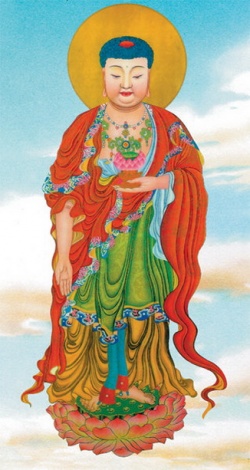Difference between revisions of "Sukhavativyuha"
Jump to navigation
Jump to search
| Line 4: | Line 4: | ||
[[スカーヴァティーヴューハ]] (Skt; Jpn [[Sukabatibyuha]] ) | [[スカーヴァティーヴューハ]] (Skt; Jpn [[Sukabatibyuha]] ) | ||
| − | "Splendor of the | + | "[[Splendor of the Blissful Land]]." Either of the two [[Sanskrit]] [[sutras]] that describe [[Amida Buddha]] and his [[Pure Land]]. [[Sukhavati]], the [[name]] of [[Amida]] [[Buddha's]] [[Pure Land]], is rendered in {{Wiki|Chinese}} as Perfect [[Bliss]]. The two [[sutras]] by this title are generally distinguished as the [[smaller Sukhavativyuha Sutra]] and the [[larger Sukhavativyuha Sutra]]. The {{Wiki|Chinese}} translation of the shorter text is called the [[Amida Sutra]], and that of the longer text is called the [[Buddha Infinite Life Sutra]]. |
</poem> | </poem> | ||
{{R}} | {{R}} | ||
Revision as of 06:00, 20 January 2014
Sukhavativyuha
スカーヴァティーヴューハ (Skt; Jpn Sukabatibyuha )
"Splendor of the Blissful Land." Either of the two Sanskrit sutras that describe Amida Buddha and his Pure Land. Sukhavati, the name of Amida Buddha's Pure Land, is rendered in Chinese as Perfect Bliss. The two sutras by this title are generally distinguished as the smaller Sukhavativyuha Sutra and the larger Sukhavativyuha Sutra. The Chinese translation of the shorter text is called the Amida Sutra, and that of the longer text is called the Buddha Infinite Life Sutra.
